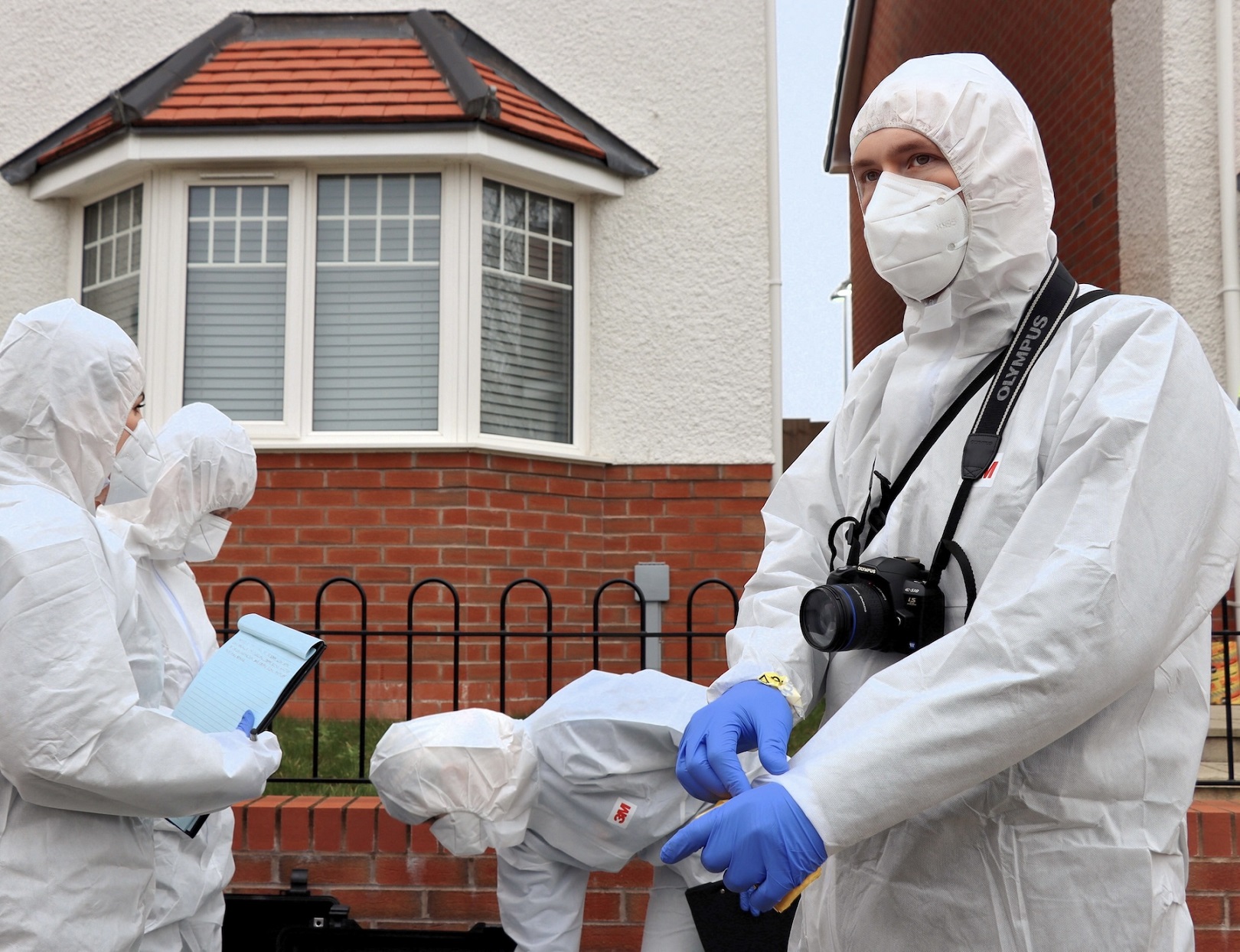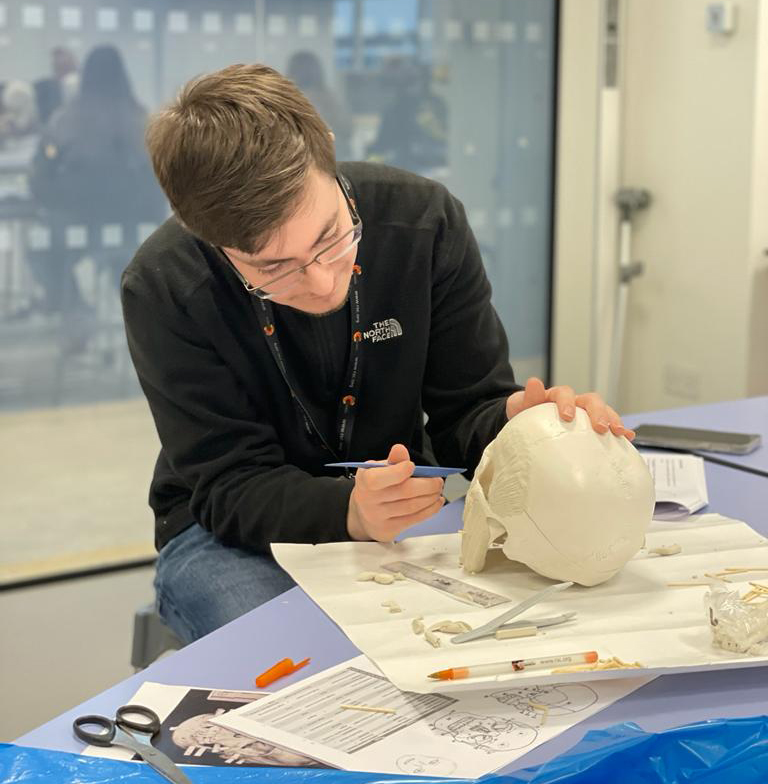MRes Analytical & Forensic Chemistry

Course details
Year of entry
2024
Duration
1 YR (FT) 2 YRS (PT)
Institution Code
G53
Location
Blended Learning, Wrexham
Course Highlights
Develop
systematic knowledge of analytical and forensic chemistry.
Train
in the use of a wide range of high-level instrumentation.
Build
transferable skills enabling career progression and potential for doctoral study.
Why choose? this course?
The MRes Analytical & Forensic Chemistry programme is designed to introduce students to a wide range of industry-standard and novel techniques applicable in forensic analysis.
- Career opportunities are available not only in the forensic sector; the key problem-solving and analytical skills developed in forensic and analytical science are widely sought after in many other industrial sectors, including the oil, gas, pharmaceutical, and food industries.
- The programme promotes the enhancement of technical understanding with emphasis on problem-solving and team/group working, awareness and, where possible, the practice of the latest developments in the discipline, and increased capability for independent learning and work through case studies and projects.
- Students will be encouraged to take on a degree of responsibility, formulating ideas proactively, dealing with open-ended and unfamiliar problems, planning and developing strategies, implementing and executing agreed plans, leading and managing teams where required and evaluating their own work and achievements. The elements within the curriculum of this programme will help to prepare students for successful careers in a variety of scientific fields.
- Blended learning with a mix of flexible self-directed study at home, with rich face-to-face teaching experiences.
Key course features
- Receive training in the use of a wide range of high-level instrumentation.
- Taught modules to develop understanding of the principles and application of research relevant to your discipline followed by a research project.
- Undertake a tailored research project in industry or in Wrexham Glyndŵr University's scientific research laboratories.
- Develop strong systematic knowledge of analytical and forensic chemistry.
- Gain proficiency in the application of acquired knowledge to challenging scenarios.
- Build transferable skills to further career progression or to prepare for doctoral study.
This degree is offered in full-time and part-time modes of attendance. There is a blended approach of online delivery and scheduled attendance. You will only have to attend university during specified block delivery weeks for modules requiring practical work, or face-to-face sessions. The in-person modules include Advanced Research Skills, Forensic Analytical Chemistry, and Human Osteology. You will attend the university for two or three days of a specified week for each module when studying either full or part-time, in addition to studying in your own time.
What you will study
MODULES
-
Advanced Research Skills: This module will aim to improve students' analytical skills and subject knowledge, enabling them to carry out effective research work. Students will be encouraged to develop their own research ideas and will have the opportunity to undertake a literature review and plan their own research study.
-
Forensic Analytical Chemistry: Students will explore and consolidate the concepts of analytical chemistry and its applications in both forensic investigation and research. Key knowledge and skills covered in this module include sample preparation, instrumental analysis methods and protocols, data processing and interpretation, and quality control/management.
-
Negotiated Learning: Students may negotiate a tailored learning and research plan with their tutors for their personal and professional development, and focus in more depth on a particular subject of their own expertise.
-
Professional Practice & Placement: Students have the opportunity to undertake a 100-hour work placement in a scientific role of their interest, and to learn more about the codes of conduct and accreditations and certifications associated with it.
-
Dissertation: Pilot Study: Students will begin their primary research on a small scale, expanding their knowledge of the appropriate practical research methods, and exploring the potential challenges and limitations they may face in the early stages of their final research project.
-
Dissertation: Research Project: Students will undertake an advanced research project, putting into practice their knowledge and understanding of the subject, and demonstrating the practical, intellectual and transferable skills they have developed throughout the programme.
The information listed in this section is an overview of the academic content of the programme that will take the form of either core or option modules. Modules are designated as core or option in accordance with professional body requirements and internal academic framework review, so may be subject to change.
Entry requirements & applying
To apply for this programme, candidates must already hold one of the following qualifications:
- An initial honours degree of Wrexham Glyndŵr University or another approved degree-awarding body with a minimum of 2:2 honours degree* which has a significant content of a Chemical, Forensic or Analytical Science equivalent to SCI509 Analytical Methods and SCI512 Instrumental Analysis.
- Equivalent qualifications of another overseas country that are deemed satisfactory by the programme team.
A non-graduate may also be considered, provided that they hold:
- A non-graduate qualification, which the University deems to be of a satisfactory standard for the purpose of post-graduate admission.
- Have relevant work experience at a level that is deemed to compensate for the lack of formal qualifications, and have held a position of responsibility within the Chemistry or Forensic sector for a minimum of three years.
*Students who have scored less than 60% (or 2.1 equivalent) in their undergraduate dissertation or equivalent research project module will be offered an interview prior to any place being offered.
In the case where there is a lack of clarity or need to gain deeper insight into a candidate’s suitability for the programme, an informal interview with the candidate may be held, which may be undertaken via Skype or other distance communication technology. This will allow the candidate an opportunity to provide evidence to the satisfaction of the interview panel of his/her ability to complete academic work of the required standard in the subject area.
Prospective students may also apply for the Recognition of Prior Learning (RPL) against specific modules in accordance with Wrexham Glyndŵr University regulations.
In some exceptional circumstances, students undertaking a placement or research project (dissertation) may be required to obtain a relevant DBS. For example, if working within schools, fieldschools or at museums where contact with children or vulnerable people could be required.
It is the students’ responsibility to determine this requirement with the relevant external institution, and to contact Student Administration to organise for the check to be completed in advance of any placement or research project. Any DBS checks required to complete the programme of study will be paid for by the university.
Teaching & Assessment
A range of summative assessment strategies will be used, including formal examinations, portfolios, reports, poster presentations, oral presentations, research and learning logs. These have been designed to reflect workplace requirements and developing technologies where appropriate. Students will receive formative assessments, particularly during the practical and self-study elements of the programme, to ensure that they can keep track of their progress and development.
Teaching and learning
Wrexham Glyndŵr University is committed to supporting our students to maximise their academic potential.
We offer workshops and support sessions in areas such as academic writing, effective note-making and preparing for assignments. Students can book appointments with academic skills tutors dedicated to helping deal with the practicalities of university work. Our Student Support section has more information on the help available.
In terms of particular needs, the University’s Inclusion Services can provide appropriate guidance and support should any students require reasonable adjustments to be made because of a recognised prevailing disability, medical condition, or specific learning difference.
The programme will be delivered via blended learning, meaning that teaching will encompass both online and classroom-based delivery, guest talks, tutorials, and laboratory workshops. This mode of delivery would mean that students can travel from a distance to study a programme, without having to commit to living in Wrexham full time, as well as allowing more flexibility for those wishing to work alongside their studies. Each module takes the form of a learning package consisting of online resources such as videos, articles, quizzes, websites, discussion boards, etc. (accessed via the module space on Moodle), tutorial support meetings and, where appropriate, practical workshops.
In addition, students will complete 100 hours of a work placement activity in an appropriate industry, such as laboratories, hospitals, museums, fieldschools, education institutions or the police. Placements can be paid or voluntary and completed on a full time, part time or ad-hoc basis, so long as they allow for adequate time to complete the assessments before the end of the second trimester. There is no restriction on where the placement can be completed, and students are encouraged to investigate a wide range of possibilities, including international roles.
The programme will be delivered through the medium of English, however students are entitled to submit assessments in Welsh. Students are also encouraged to engage in placements which support the Welsh language where available and appropriate.
Career prospects
Our Careers & Employability service is there to help you make decisions and plan the next steps towards a bright future. From finding work or further study to working out your interests, skills and aspirations, they can provide you with the expert information, advice and guidance you need.
Graduates of this programme may go on to work in:
- Analytical Chemistry
- Toxicology
- Forensic Science
- Crime Scene Science
- Research Scientist
- Laboratory Technician
- Education
Or choose to investigate further research opportunities, such as PhD Study.
Fees & funding
You do not have to pay your tuition fees upfront.
The fees you pay and the support available will depend on a number of different factors. Full information can be found on our fees & finance pages. You will also find information about what your fees include in the fee FAQs.
All fees are subject to any changes in government policy, view our postgraduate fees.
Programme specification
You can see the full programme specification here.



